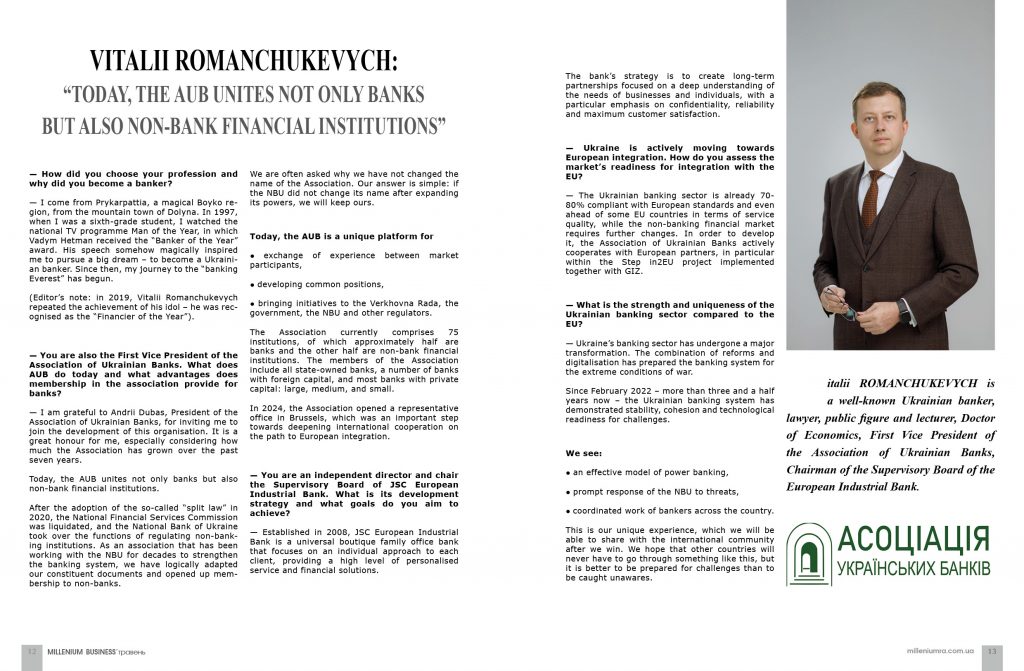Vitalii ROMANCHUKEVYCH is a well-known Ukrainian banker, lawyer, public figure and lecturer, Doctor of Economics, First Vice President of the Association of Ukrainian Banks, Chairman of the Supervisory Board of the European Industrial Bank.

— How did you choose your profession and why did you become a banker?
— I come from Prykarpattia, a magical Boyko region, from the mountain town of Dolyna. In 1997, when I was a sixth-grade student, I watched the national TV programme Man of the Year, in which Vadym Hetman received the “Banker of the Year” award. His speech somehow magically inspired me to pursue a big dream – to become a Ukrainian banker. Since then, my journey to the “banking Everest” has begun.
(Editor’s note: in 2019, Vitalii Romanchukevych repeated the achievement of his idol – he was recognised as the “Financier of the Year”).
— You are also the First Vice President of the Association of Ukrainian Banks. What does AUB do today and what advantages does membership in the association provide for banks?
— I am grateful to Andrii Dubas, President of the Association of Ukrainian Banks, for inviting me to join the development of this organisation. It is a great honour for me, especially considering how much the Association has grown over the past seven years.
Today, the AUB unites not only banks but also non-bank financial institutions.
After the adoption of the so-called “split law” in 2020, the National Financial Services Commission was liquidated, and the National Bank of Ukraine took over the functions of regulating non-banking institutions. As an association that has been working with the NBU for decades to strengthen the banking system, we have logically adapted our constituent documents and opened up membership to non-banks.
We are often asked why we have not changed the name of the Association. Our answer is simple: if the NBU did not change its name after expanding its powers, we will keep ours.
Today, the AUB is a unique platform for
● exchange of experience between market participants,
● developing common positions,
● bringing initiatives to the Verkhovna Rada, the government, the NBU and other regulators.
The Association currently comprises 75 institutions, of which approximately half are banks and the other half are non-bank financial institutions. The members of the Association include all state-owned banks, a number of banks with foreign capital, and most banks with private capital: large, medium, and small.
In 2024, the Association opened a representative office in Brussels, which was an important step towards deepening international cooperation on the path to European integration.
— You are an independent director and chair the Supervisory Board of JSC European Industrial Bank. What is its development strategy and what goals do you aim to achieve?
— Established in 2008, JSC European Industrial Bank is a universal boutique family office bank that focuses on an individual approach to each client, providing a high level of personalised service and financial solutions.
The bank’s strategy is to create long-term partnerships focused on a deep understanding of the needs of businesses and individuals, with a particular emphasis on confidentiality, reliability and maximum customer satisfaction.
— Ukraine is actively moving towards European integration. How do you assess the market’s readiness for integration with the EU?
— The Ukrainian banking sector is already 70-80% compliant with European standards and even ahead of some EU countries in terms of service quality, while the non-banking financial market requires further changes. In order to develop it, the Association of Ukrainian Banks actively cooperates with European partners, in particular within the Step in2EU project implemented together with GIZ.
— What is the strength and uniqueness of the Ukrainian banking sector compared to the EU?
— Ukraine’s banking sector has undergone a major transformation. The combination of reforms and digitalisation has prepared the banking system for the extreme conditions of war.
Since February 2022 – more than three and a half years now – the Ukrainian banking system has demonstrated stability, cohesion and technological readiness for challenges.
We see:
● an effective model of power banking,
● prompt response of the NBU to threats,
● coordinated work of bankers across the country.
This is our unique experience, which we will be able to share with the international community after we win. We hope that other countries will never have to go through something like this, but it is better to be prepared for challenges than to be caught unawares.
